D. Puccini opera "Madame Butterfly"
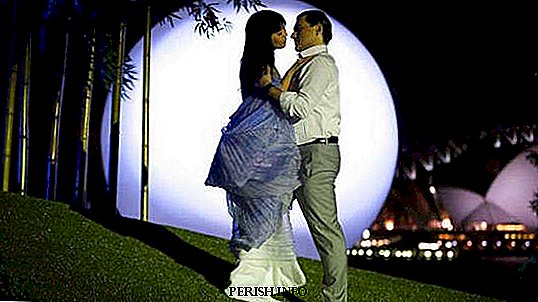
Puccini's opera Madame Butterfly has an unusual fate, because this performance failed miserably at its premiere. And none of the musicians who took part in the production, did not doubt its unconditional success. The public was dissatisfied with familiar motives: "This is from Bohemians", dissatisfied exclamations were heard, and asked to give something new. However, later the slightly modified score had already received overwhelming success with the audience. This opera is fascinating with its beauty and unusual plot. Its special charm not only in Puccini’s genius music, but also that the play allows you to feel the extraordinarily attractive special culture of Japan.
Summary of the opera Puccini "Madame Butterfly" and a lot of interesting facts about this piece read on our page.
Characters | Vote | Description |
| Benjamin Franklin Pinkerton | tenor | lieutenant navy usa |
| Chio-chio-san | soprano | naive 15 year old japanese girl |
| Suzuki | mezzo-soprano | maid chio chio san |
| Goro | tenor | estate agent, matchmaker |
| Kat Pinkerton | mezzo-soprano | new wife benjamin |
| Prince Yamadori | baritone | rich young man japanese |
| Sharpless | baritone | US Consul in Nagasaki |
| Bonze | bass | Uncle Chio-Chio San |
Madame Butterfly Summary
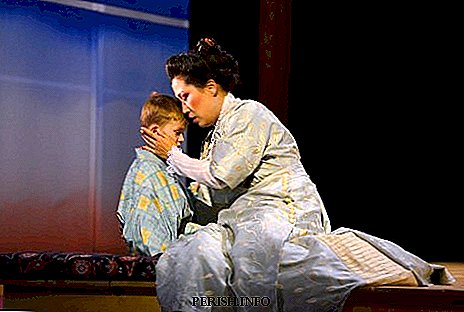
The opera is extraordinarily touching and sad, showing a naive and faithful love story. It reveals the tragic fate of the still young and naive Japanese geisha Chio-Chio-san, nicknamed Butterfly.
A young and charming officer marries a charming fifteen-year-old girl who is madly in love with him, but his thoughts are far from clear. The lieutenant obviously went to this union, knowing that in his native country he would be declared invalid, and of course he did not care at all about the feelings of his wife. Meanwhile, Chio-Chio-san sacrificed to many by agreeing to this marriage, she even decided to abandon her religion and accept her husband’s faith.
About a year after the marriage, the naval officer returns to America, leaving his wife and his newly born son alone. There, he forgets about his abandoned lover and marries again. And what about Chio-Chio-san? She devotedly waits for him, rejecting the advances of a sufficiently high-ranking person. Three years later, the lieutenant again resides in Japan with his new wife, asking him to pick up his son, which of course he learns about the Butterfly. She has nothing left but to go to a desperate act and commit suicide.
| Duration of performance | ||
| I Act | Act II | Act III |
| 55 min. | 50 min | 35 min. |
A photo:
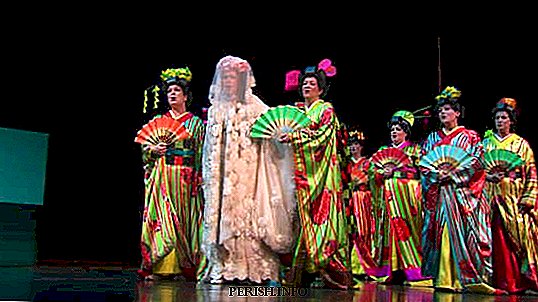
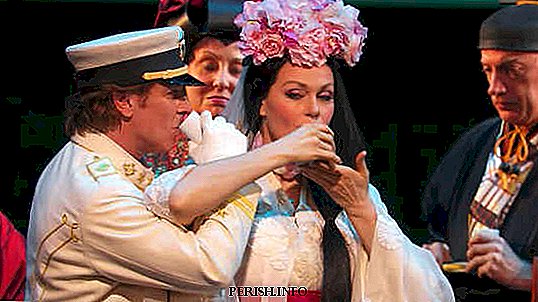
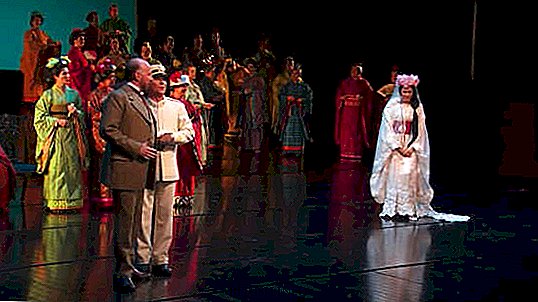
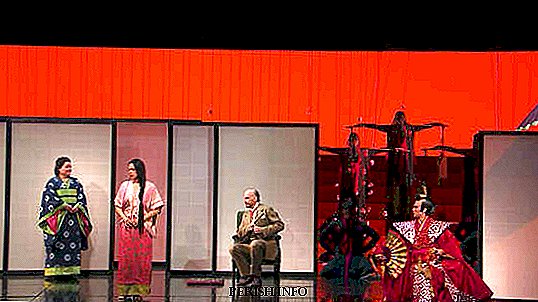
Interesting Facts
- Between 1915 and 1920, Japanese opera singer Tamaki Miura won worldwide fame for the role of Chio Chio-san. In the garden of Glover Garden in Nagasaki there are monuments to the singer and to Giacomo Puccini.
- A funny incident occurred at one of the performances in the Ukrainian theater. Shaprles, addressing the child of the main character, asks his name, but he does not answer him. The role of this baby was performed by the son of the costume designer. The theater workers decided to play a trick on everyone and explained to the child that if they ask him a question, they must answer. In his next speech, the young actor did a great job with this task and shouted “Alyosha” in a ringing voice to the usual question of Sharpless! Needless to say, success was fantastic?
- The work of D. Puccini became the basis for more than a dozen different screen versions, among which can be noted the "Fatal Attraction" (1982) with Michael Douglas, the Italian-Japanese project of the same name in 1954, as well as a number of European and Asian musicals.
- Interestingly, the libretto was done fairly quickly, but the work on the opera itself was delayed because of the new D. Puccini's hobbies for car sports. In the midst of creating the score, the composer had an accident and suffered a serious leg injury, which naturally slowed down his work.
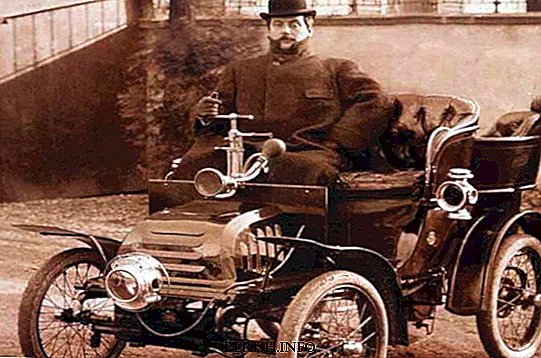
- Puccini's opera is deeply tragic and full of beautiful lyrical compositions, it would seem that it is simply doomed to success, but not everything is so simple. The original production failed miserably. Not only was the newspaper full of headlines about a “boring” and “boring” premiere, the audience began to disperse by the end of the second act.
- It is believed that the initial failure of the opera was rigged by the composer’s enemies, as was the case with the opera. D. Rossini "The Barber of Seville". Whatever it was, it only benefited the play. Puccini took into account some comments and reworked the libretto, reducing the plot and saturating it with dynamism. The new premiere took place in May 1904 and already the names are a resounding success. The hall standing welcomed the performers and asked for an encore arias from each act. We offer you to see this beautiful, touching love story that will not leave anyone indifferent.
- In total, the composer has written five versions of the opera, the first in 1904, and the last in 1907.
Popular arias from the opera Madame Butterfly
Pinkerton's aria "Dovunque al mondo" - listen
Pinkerton and Chio-Chio San duo "Vogliatemi bene" - to listen
Aria Chio-Chio San "Un bel di vedremo" - listen
The story of the creation of "Madame Butterfly"
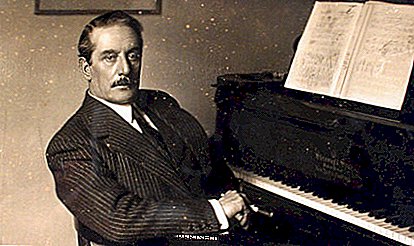 The literary basis for the play "Madame Butterfly" was the work of John L. Long, which was soon reworked by Belasco. The drama was successfully staged in London at the Prince’s Theater of York, called “Geisha,” and met her there. Puccini. He was immediately attracted by her extraordinary strength and exoticism.
The literary basis for the play "Madame Butterfly" was the work of John L. Long, which was soon reworked by Belasco. The drama was successfully staged in London at the Prince’s Theater of York, called “Geisha,” and met her there. Puccini. He was immediately attracted by her extraordinary strength and exoticism.
It is noteworthy that the appeal to a country like Japan was very much in the spirit of the art of the time. Many artists and musicians sought to add new and unusual colors to the palette. However, it should be understood that for Puccini it was not the goal to demonstrate the national Japanese flavor in music. He tried to focus all the attention on the drama of the individual. Moreover, the composer masterfully turned out to deepen the content of the drama and make the plot incredibly attractive. However, a few Japanese melodies, Puccini still used in his score and organically incorporated them into the musical fabric.
The composer turned to his librettists - L. Illiku and D. Jacoze, who created the literary text for the opera. When the score was ready, in February 1904, the premiere of the opera Madame Butterfly was held in Milan. It is no secret that she was booed by the public, who did not like absolutely everything, from music to the plot and even singers. Thus, a gust of wind opened the hem of Storkio's dress and the audience seemed to be in a position, so further performance continued under the shouts of "Butterfly is pregnant," as well as whistling, lowing and even crowing of the raging public. However, newspaper critics were not much more polite. The author was very upset after such a premiere and he had to abandon the second presentation, which was to be held in La Scala. For this he was forced to pay a large amount of the penalty.
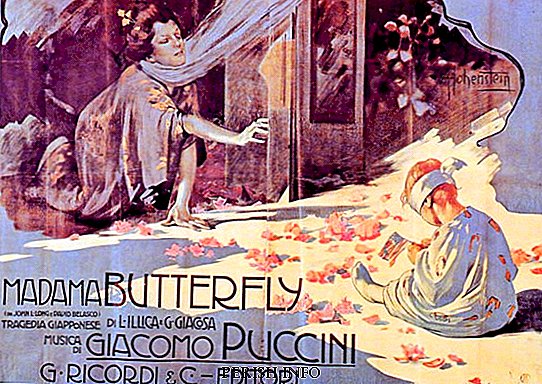
Having slightly reworked the score, in particular, dividing the second, too long action, after three months Puccini staged the play again. After these changes, the premiere was held in Brescia under the control of the legendary Arturo Toscanini. It is not difficult to guess that this time she was waiting for a real triumph. Enthusiastic spectators demanded the performance of an encore, and after each performance the composer had to go on stage to bow.
Productions
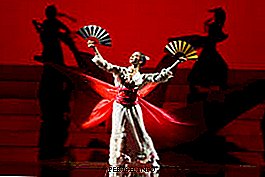
The Russian public was able to get acquainted with Puccini's masterpiece in 1908. She was staged in St. Petersburg at the Conservatory Theater.
Among the numerous productions of the play, the most interesting is the very spectacular work of avant-garde director Robert Wilson, which was performed in 1992 in "Opera-Bastille"
One of the most successful modern productions was performed by the same director in May 2004 at a festival held in Torre del Lago, under the direction of P. Domingo. In Moscow, the premiere of this version took place on June 12, 2005 at the Bolshoi Theater. Interestingly, the most important requirement for the play Wilson was to transmit all emotions only with the help of his voice, but not movements. At the same time, he himself controlled all the processes, even the lighting was built independently. It is noteworthy that this version of the critics recognized the best interpretation.
A similar idea - to remove all unnecessary, to concentrate on the music, embodied and Yuri Alexandrov in his production in St. Petersburg, only the events he suffered in the postwar period, after the terrible explosions in Hiroshima and Nagasaki.
In addition to theatrical productions, the opera was successfully screened in 1954 by director Carmine Gallone. In 1974, Jean-Pierre Ponnel shot his version of the legendary work, together with conductor Herbert von Karajan. In addition, the drama was filmed in 1980 by Roman Tikhomirov and in 1995 by Frederick Mitterrand.
The beauty of this exotic opera can be appreciated only by looking at it. Therefore, we suggest you to get acquainted with another masterpiece of classical music right now. The legendary opera by G. Puccini will help you to penetrate the special flavor of the country of the rising sun and plunge into Japanese culture, seasoned with real Italian music.Madame Butterfly".

Leave Your Comment